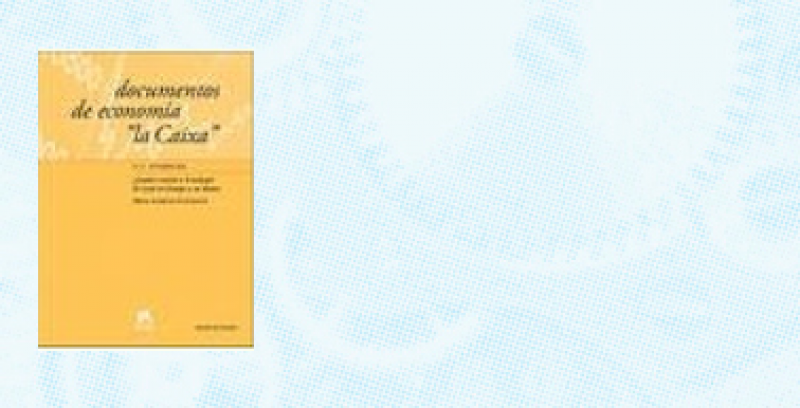Public time policies
El cuidado de las personas. Un reto para el siglo XXI (Caring for people. A challenge for the 21st century)
Ambit: Spain
Subject: Care.
Author: Constanza Tobío, MªSilveria Agulló, MªVictoria Gómez and Mª Teresa Martín Palomo
Review: The study reviews widely and from different dimensions the social organization of care: its historical construction, the sociodemographic changes that accompany it, the needs of care throughout the life cycle, caregivers and care policies.

Care architectures. Collaborative housing for old people.
Ambit: Basque Country. Europe.
Subject: Collaborative housing for older people.
Author: Irati Mogollón and Ana Fernández. EMAKUNDE. Basque Institute of Women
Review: The study contextualizes the phenomenon of collaborative housing for the elderly in the Basque Country and in different European countries, pointing out how they respond to the care needs of the people and how the architecture uses this effect.

Educational opportunities in Barcelona 2016: The education of children and adolescents in the city.
Area: Barcelona
Subject: Educational opportunities - childhood and adolescence
Author: Infancy and Adolescence Institute of Barcelona This report presents, in a broad sense, an analysis of the situation of education of children and adolescents in Barcelona, in order to contribute to improve municipal education policy and nourish the social debate on education.

Conciliació i nous usos del temps [Life/Work Balance and New Uses of Time]
Language: Catalan
Ambit: Catalonia
Subject: Equality - Work
Author: Anna Freixas Farré
Published by: Institut Català de la Dona, Quaderns de l'Institut collection, no. 8
Barcelona, 2007
Review: A discussion of new proposals for promoting shared responsibility and the division of time and labour as essential conditions for advancing towards a fairer, more just society.

El trabajo doméstico cuenta: Las cuentas de los hogares en España [Housework Counts: the Accounts of Spanish Household
Language: Spanish
Ambit: Spain
Subject: Equality - Work
Authors: María Luisa Moltó and Ezequiel Uriel
Madrid, 2008
Review: Housework accounts for 42.5% of Spanish GDP. According to this study, in 2003, 46,000 hours were dedicated to such work, generating total value of 332,506 million euros ? 7,916 euros per capita. The authors place particular emphasis on existing imbalances in the way housework is distributed between men and women.

Freeing Time? The "Family Time Economies" of Nurses
Ambit: World
Subject: Working Time
Authors: JaneMaree Maher, Jo Lindsay and Anne Bardoel
Work, Employment and Society, 2009
Review: This study investigates how nurses use flexibility to support time for caring for their families, showing that the complex work schedules generated by shift work are reflected in domestic life, as nurses and their partners use job flexibility to ensure they have time for family care. However, this also competes with the desire to make and preserve free, unstructured family time.

Nuevos tiempos del trabajo: entre la flexibilidad competitiva de las empresas y las relaciones de género [New Times for Work: Between the Competitive Flexibility of Business and Gender Relations]
[New Times for Work: Between the Competitive Flexibility of Business and Gender Relations]
Ambit: Spain
Subject: Equality - Work
Authors: Carlos Prieto, Ramón Ramos and Javier Callejo, coordinators.
Centro de Investigaciones Sociológicas, 2008
Review: Presenting the results from research into changes in employment and gender relations over the last thirty years. The study is divided into two blocks: the first surveys changing trends in working times; the second discusses the role that the organisation of social time plays in new employment relations.

La conciliación de las jóvenes trabajadoras: nuevos discursos, viejos problemas [Work/Life Balance and Young Working Women: New Discourses, Old Problems]
[Work/Life Balance and Young Working Women: New Discourses, Old Problems]
Language: Spanish
Ambit: Spain
Subject: Equality
Authors: Teresa Torns Martín and Sara Moreno Colom
Revista de Estudios de Juventud, no. 83. 2008
Review: This article reflects on the contradiction represented for young working women by discourses about the work/family balance as they continue to face the same old problems whilst no alternative solutions are offered.

¿Cuánto cuesta ir al trabajo? El coste en tiempo y en dinero [How Much does it Cost to Get to Work? The Cost in Both Time and Money]
[How Much does it Cost to Get to Work? The Cost in Both Time and Money]
Language: Spanish
Ambit: Catalonia
Subject: Work
Author: Maria Gutiérrez-Domènech
"la Caixa". Barcelona, 2008
Review: A study of the time spent travelling to and from the workplace. The author calculates that, on average, a worker spends 57 minutes on such travel every day, the equivalent of around 8 euros a day, or 40% more if they use public transport.

La «flexicurity» a Itàlia i Espanya: treball, benestar i qualitat de vida ["Flexicurity" in Italy and Spain: Work, Wellbeing and Quality of Life]
["Flexicurity" in Italy and Spain: Work, Wellbeing and Quality of Life]
Ambit: Europe
Subject: Work
Authors: Antonio Martín Artiles, Pilar Carrasquer, Fausto Miguélez and Óscar Molina
Published with support from: QUIT, Centre d'Estudis Sociològics sobre la Vida Quotidiana i el Treball, 2009
Review: The objective of this project is to assess the capacity of local institutions and stakeholders to interpret and implement, in an innovative way, legislation governing social and employment policy.

The mobile phone, perpetual contact and time pressure
Ambit: World
Subject: Time Uses
Authors: Michael Bittman, Judith E. Brown and Judy Wajcman
Work, Employment and Society, 2009
Review: This article explores theories that the impossibility of being 'out of touch' leads to increased time pressure and that perpetual contact extends work into the home or intensifies work in other ways. The study concludes that mobile phone use is not associated with more harried leisure, though there is some evidence that frequent use of mobiles is associated with work intensification.

Working time developments 2009
Ambit: Europe
Subject: Work
Author: European Foundation for the Improvement of Living and Working Conditions
Dublin, 2009
Review:This study presents an overview of the length of the working day in the European Union and Norway. The data was gathered with the cooperation of national centres that are members of the European Industrials Relations Observatory (EIRO).


